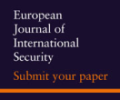European Journal of International Security, Issue 2:1. View full article here.
By Ian Hurd, Northwestern University, USA
In 1945, the UN Charter made it illegal for governments to go to war with each other. It enacted the first ever general legal ban on the use or threat of force by one state against another and has been widely hailed since then as a dramatic contribution to world order – Michael Byers called it “one of the twentieth century’s greatest achievements.” Even while most everyone recognizes that outlawing war cannot realistically be expected to actually put an end war, the fact that inter-state war is generally illegal is cited as a bright line that separates the pre-1945 world from the post-, a ‘legalized’ world from its prior ‘political’ one. As Thomas Franck said, it cements the “idea that the use of force by a state… could be violative of the legal order’s very foundations.”
My article on the ‘Permissive Power of the Ban on War’ opens up this conventional wisdom in two ways. First, I show that the UN Charter does not in fact ‘ban’ war. Instead, it regulates the reasons that states may go to war. It forbids the use of force for any reason except ‘self-defense’ and then places some rules around self-defense. It is therefore as much a permissive rule – one that permits things to happen – as it is a constraining rule – one that forbids actors from doing something. Second, I suggest that much of the impact of international law in world politics comes through this permissive function, and that recognizing it is an important step toward appreciating the close connections between international legalization and global power politics.
The permissive side of the Charter’s rules on war is easy to see. One needs to read Article 2(4) alongside Article 51: the former says that “all Members shall refrain in their international relations from the threat or use of force…” and the latter says that “nothing in the present Charter shall impair the inherent right of individual or collective self-defense if an armed attack occurs against a Member of the United Nations.” Together, they create the legal system that is so well-known today: governments are forbidden from using force except as needed for self-defense (or as authorized by the Security Council, which does not concern me here).
The Charter constrains the motives that can be used to justify war by governments. It rules out wars that are pursued for the purposes of expansion, aggression, retribution, spite, colonialism, and – especially relevant since the 1990s – humanitarian rescue. It does not enumerate the forbidden motives; they are defined instead as the unspoken contrast to the singular motivation for war which it does permit: self-defense.
By identifying self-defense as the only lawful reason for war, the Charter empowers that concept and generates a new politics of legitimation around ti. It gives governments a new way to justify their military operations. ‘Self-defense’ has become a powerful discursive resource for states. There are political rewards to be had from presenting one’s wars as necessary for self-defense, just as their are costs to be borne for those who cannot or do not make that justification. The appeal to self-defense as a means to legitimize state action through law is possible after 1945 in ways it was not before.
The rules on war change the terms of political legitimation for war and thus change the politics around war. They do not outlaw war. The difference between pre-1945 and post-1945 comes from the different discursive categories by which war is permitted to be justified in the two periods.
This points to the ‘permissive’ function of international law, which has recently been highlighted by Charlotte Peevers, Keally McBride, Benjamin Allen Coates, and others. By this I mean the the power that an agent or idea gets by being able to show itself on the right side of lawfulness. The rules on war are just one example of a more general phenomenon: how international legalization empowers governments rather than limit them. The permissive power of law puts in the hands of governments tools with which to pursue policies. This enhances their capacities and is a source of power for them. By giving an explicit legal rationale for some actions, the law facilitates them and enables actors.
In a world where acting lawfully is seen as legitimizing, a legal rationale is an important resource. The permissive power of law therefore presumes the widespread acceptance of the idea of the rule of law. And indeed among scholars of international relations, there is virtual unanimity that the international rule of law exists and is desirable – as McBride says, “it current stands as a largely uncontested self-evident good.”
This has implications that go against much of the scholarly narrative on international law. International law, especially on the regulation of war and on human rights, is often assumed to be morally and politically progressive on the grounds that it necessarily constraints state agency. This is at best a partial perspective. The permissive side of legalization is important because it shows that law also empowers governments and thus necessarily serves to enhance state control. This should be no surprise since international law is created by governments and so it presumably serves some purpose that is important to them. Powerful governments make international law to secure their power. The ban on war in the UN Charter both limits their freedom and enhances it by legitimating the use of force for the purpose of defending the ‘self’ against its perceived external enemies. It adds to the power of governments that have the capacity and will to use it.
Ian Hurd is Associate Professor of Political Science at Northwestern University. His new book, How to Do Things With International Law, will appear in September.




No comments yet.